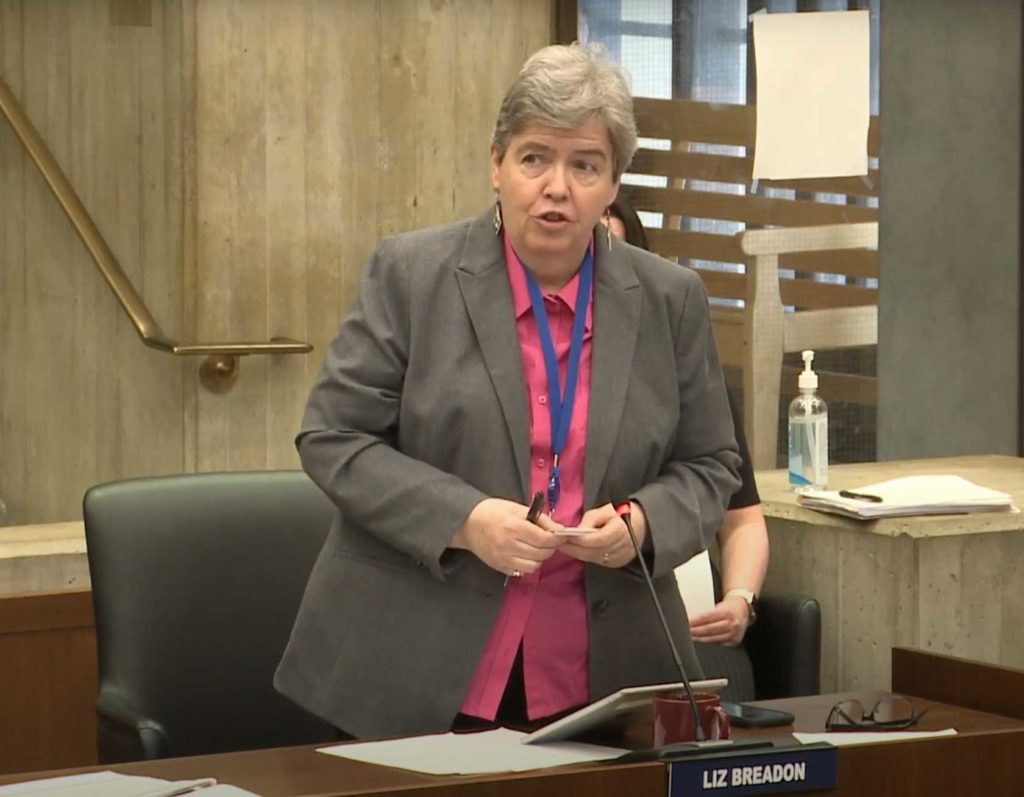
The Boston City Council will soon consider whether to maintain virtual access to city proceedings, or revert back to pre-pandemic in-person meetings, hearings and working sessions.
Allston-Brighton Councilor Liz Breadon will formally file the measure that would make virtual accommodations mandatory for the Council, setups popularized during the COVID-19 pandemic and under Gov. Charlie Baker’s executive order that enabled public bodies to meet remotely.
The governor’s latest executive order on remote meetings is set to expire in the summer.
“We can’t just simply retreat from the pandemic provisions,” Breadon told GBH News.
Her proposal would apply to the City Council as well as 18 of the city’s other public boards, commissions and trusts.
“This remote participation is not simply about safety or convenience in the midst of the pandemic, but it’s really about maintaining equitable and meaningful access for the public,” she said.
A similar measure was filed last year by Breadon and outgoing East Boston Councilor Lydia Edwards. The proposal fizzled out as the pandemic and virtual access to public meetings progressed.
Breadon acknowledged the move would require funding. She said she believes the increased access will be worth the yet-to-be-determined price tag.
“It’s really about the City Council setting a standard for how we continue to engage with people who have got disabilities and seniors and people with limited access to transportation,” she said, pointing to a typical 45-minute public transit commute from her district’s Oak Square area to City Hall.
Preserving remote access, Breadon added, would also help people who have work and family obligations and would otherwise be unable to attend a meeting in-person.
Bill Henning, executive director at the Boston Center for Independent Living, agreed.
“People have lives. It’s difficult to squeeze in meetings,” he told GBH News. “Virtual allows you to be in your place of employment, or your home, or wherever and participate in civic affairs…especially for people with disabilities.
“I understand there’s some costs associated with it, there are bugs to be worked out,” Henning continued. “This is the technology age. Those are things we would hope major city governments like the City of Boston would embrace. … I anticipate soon enough there’ll probably be lawsuits saying this is a reasonable accommodation under the Americans with Disabilities Act.”
As of Tuesday morning, the Boston City Council’s upcoming agenda lists At-Large Councilor Ruthzee Louijeune as a measure co-sponsor.
Breadon’s latest proposal comes about a month after Council President Ed Flynn sent a memo to Council staff stating that members should brace for all hearings and working sessions to default to in-person beginning July 15, when the state’s pandemic open meeting law provisions are set to expire.
“Barring any unforeseen extension or other circumstances, we expect all hearings and working sessions to be in person after July 15th,” Flynn’s memo said.
Under pre-pandemic rules, hearings, where issues and legislative proposals are typically heard along with public and expert panelist testimony, were routinely recorded and posted online. But working sessions, where Councilors finalize legislative minutia with selected experts and mayoral administration officials, would be physically accessible to the public, with virtual access subject to a committee.
For those virtual working sessions, Flynn’s memo said, the public can request links to watch, “but the working session itself will not be livestreamed.”
A quick glimpse of the Boston City Council’s YouTube page shows few, if any, working sessions prior to the outbreak COVID-19 pandemic in March 2020.
Kade Crockford, director of the ACLU of Massachusetts’ Technology for Liberty program, called the planned return to in-person working sessions “problematic” in an appearance on GBH’s Talking Politics earlier this month.
In a later interview with GBH News, Crockford said it would be “troubling” and “confusing” to see the Boston City Council move “towards more secrecy” after successfully having meetings with expanded access.
“It was easy for the public and the press to follow along,” Crockford said. “I have a hard time believing more transparency is bad for the people of Boston.”
Crockford was part of the coalition that advocated for the Massachusetts Governor’s Council, a body that weighs pardons and sentence commutations, to continue livestreaming its meetings. The Council ended livestreaming its sessions in March, but recently reversed course and has since resumed livestreaming its meetings and posting recordings on its YouTube channel.
Breadon told GBH News she believes City Council President Ed Flynn will eventually endorse the measure to preserve virtual access the Boston City Council’s proceedings.
“He’s a tremendous advocate for people with disabilities, and so I’m hoping that he would support this,” she said when asked if her measure would spark tension between herself and Flynn.
“I’m not setting myself up in opposition to his position on this, but I really think it’s about setting a standard for how we continue to engage with people.”
Breadon is set to formally introduce the proposal at the Council’s Wednesday meeting.
Saraya Wintersmith covers Boston City Hall for GBH News.






